高考英语语法精讲精练精析-状语从句
- 格式:doc
- 大小:84.00 KB
- 文档页数:21
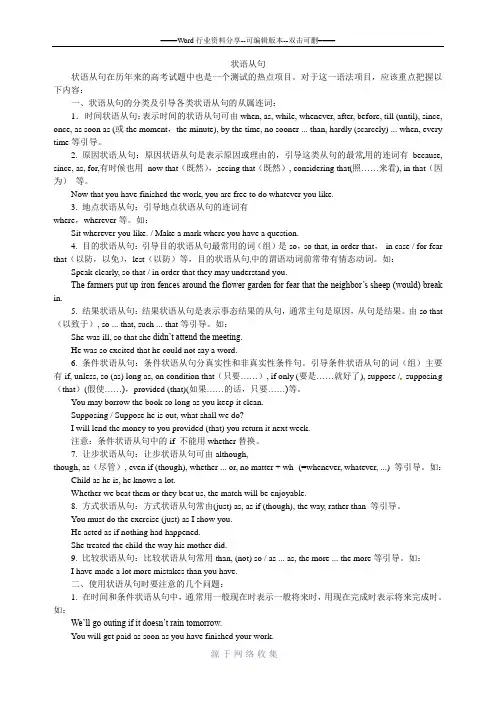
状语从句状语从句在历年来的高考试题中也是一个测试的热点项目。
对于这一语法项目,应该重点把握以下内容:一、状语从句的分类及引导各类状语从句的从属连词:1.时间状语从句:表示时间的状语从句可由when, as, while, whenever, after, before, till (until), since, once, as soon as (或the moment,the minute), by the time, no sooner ... than, hardly (scarcely) ... when, every time等引导。
2. 原因状语从句:原因状语从句是表示原因或理由的,引导这类从句的最常用的连词有because, since, as, for,有时候也用now that(既然),seeing that(既然), considering that(照……来看), in that(因为)等。
Now that you have finished the work, you are free to do whatever you like.3. 地点状语从句:引导地点状语从句的连词有where,wherever等。
如:Sit wherever you like. / Make a mark where you have a question.4. 目的状语从句:引导目的状语从句最常用的词(组)是so,so that, in order that,in case / for fear that(以防,以免),lest(以防)等,目的状语从句中的谓语动词前常带有情态动词。
如:Speak clearly, so that / in order that they may understand you.The farmers put up iron fences around the flower garden for fear that the neighbor’s sheep (would) break in.5. 结果状语从句:结果状语从句是表示事态结果的从句,通常主句是原因,从句是结果。
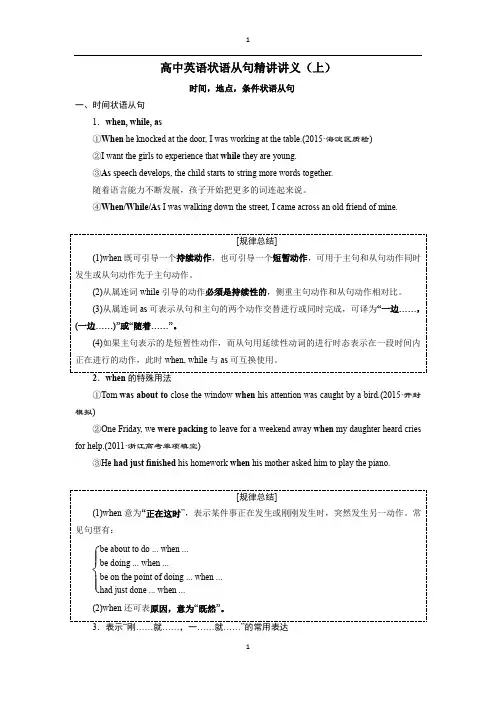
高中英语状语从句精讲讲义(上)时间,地点,条件状语从句一、时间状语从句1.when, while, as①When he knocked at the door, I was working at the table.(2015·海淀区质检)②I want the girls to experience that while they are young.③As speech develops, the child starts to string more words together.随着语言能力不断发展,孩子开始把更多的词连起来说。
④When/While/As I was walking down the street, I came across an old friend of mine.[规律总结](1)when 既可引导一个持续动作,也可引导一个短暂动作,可用于主句和从句动作同时发生或从句动作先于主句动作。
(2)从属连词while 引导的动作必须是持续性的,侧重主句动作和从句动作相对比。
(3)从属连词as 可表示从句和主句的两个动作交替进行或同时完成,可译为“一边……,(一边……)”或“随着……”。
(4)如果主句表示的是短暂性动作,而从句用延续性动词的进行时态表示在一段时间内正在进行的动作,此时when, while 与as 可互换使用。
2.when 的特殊用法①Tom was about to close the window when his attention was caught by a bird.(2015·开封模拟)②One Friday, we were packing to leave for a weekend away when my daughter heard cries for help.(2011·浙江高考单项填空)③He had just finished his homework when his mother asked him to play the piano.[规律总结](1)when 意为“正在这时”,表示某件事正在发生或刚刚发生时,突然发生另一动作。
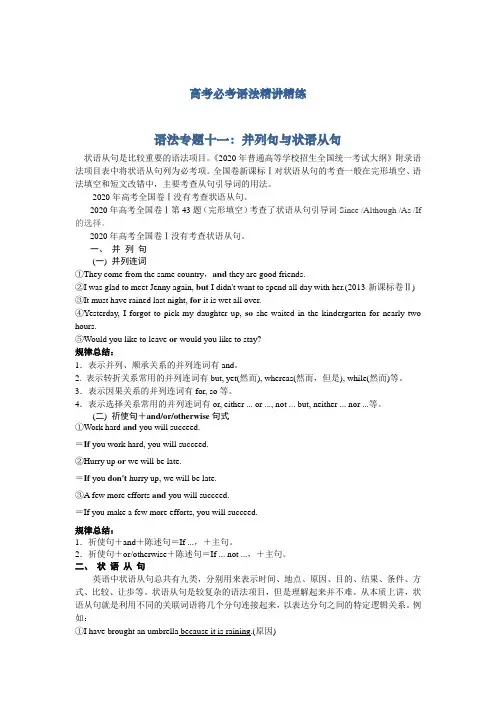
高考必考语法精讲精练语法专题十一:并列句与状语从句状语从句是比较重要的语法项目。
《2020年普通高等学校招生全国统一考试大纲》附录语法项目表中将状语从句列为必考项。
全国卷新课标Ⅰ对状语从句的考查一般在完形填空、语法填空和短文改错中,主要考查从句引导词的用法。
2020年高考全国卷Ⅰ没有考查状语从句。
2020年高考全国卷Ⅰ第43题(完形填空)考查了状语从句引导词Since /Although /As /If 的选择。
2020年高考全国卷Ⅰ没有考查状语从句。
一、并列句(一) 并列连词①They come from the same country,and they are good friends.②I was glad to meet Jenny again, but I didn't want to spend all day with her.(2013·新课标卷Ⅱ)③It must have rained last night, for it is wet all over.④Yesterday, I forgot to pick my daughter up, so she waited in the kindergarten for nearly two hours.⑤Would you like to leave or would you like to stay?规律总结:1.表示并列、顺承关系的并列连词有and。
2. 表示转折关系常用的并列连词有but, yet(然而), whereas(然而,但是), while(然而)等。
3.表示因果关系的并列连词有for, so等。
4.表示选择关系常用的并列连词有or, either ... or ..., not ... but, neither ... nor ...等。
(二) 祈使句+and/or/otherwise句式①Work hard and you will succeed.=If you work hard, you will succeed.②Hurry up or we will be late.=If you don't hurry up, we will be late.③A few more efforts and you will succeed.=If you make a few more efforts, you will succeed.规律总结:1.祈使句+and+陈述句=If ...,+主句。
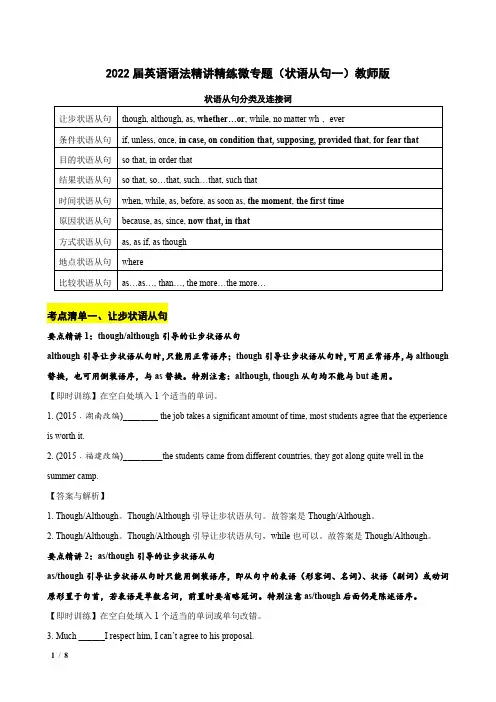
2022届英语语法精讲精练微专题(状语从句一)教师版状语从句分类及连接词考点清单一、让步状语从句要点精讲1:though/although引导的让步状语从句although引导让步状语从句时,只能用正常语序;though引导让步状语从句时,可用正常语序,与although 替换,也可用倒装语序,与as替换。
特别注意:although, though从句均不能与but连用。
【即时训练】在空白处填入1个适当的单词。
1. (2015﹒湖南改编)________ the job takes a significant amount of time, most students agree that the experience is worth it.2. (2015﹒福建改编)_________the students came from different countries, they got along quite well in the summer camp.【答案与解析】1. Though/Although。
Though/Although引导让步状语从句。
故答案是Though/Although。
2. Though/Although。
Though/Although引导让步状语从句,while也可以。
故答案是Though/Although。
要点精讲2:as/though引导的让步状语从句as/though引导让步状语从句时只能用倒装语序,即从句中的表语(形容词、名词)、状语(副词)或动词原形置于句首,若表语是单数名词,前置时要省略冠词。
特别注意as/though后面仍是陈述语序。
【即时训练】在空白处填入1个适当的单词或单句改错。
3. Much ______I respect him, I can’t agree to his proposal.4. Strange ________ it might sound, his idea was accepted by all the people at the meeting.5. Try ________ she might, Carolina couldn't get the door open.6. Doctor as he is, but he knows little about medicine. 改错7. Heavy as it is raining, they are still working outside. 改错【答案与解析】3. as/though。
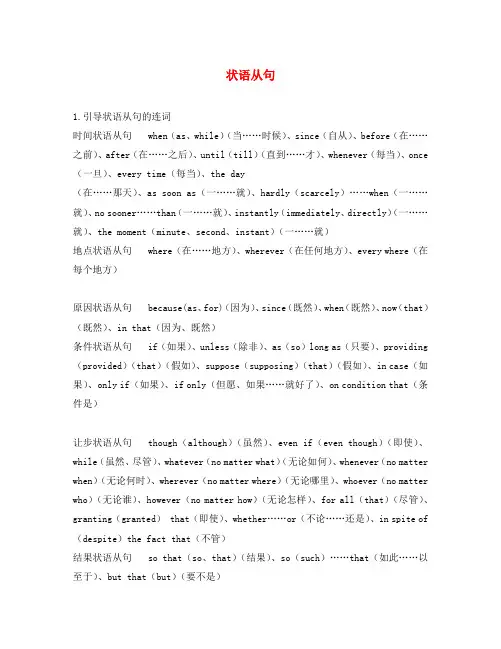
状语从句1.引导状语从句的连词时间状语从句when(as、while)(当……时候)、since(自从)、before(在……之前)、after(在……之后)、until(till)(直到……才)、whenever(每当)、once (一旦)、every time(每当)、the day(在……那天)、as soon as(一……就)、hardly(scarcely)……when(一……就)、no sooner……than(一……就)、instantly(immediately、directly)(一……就)、the moment(minute、second、instant)(一……就)地点状语从句where(在……地方)、wherever(在任何地方)、every where(在每个地方)原因状语从句because(as、for)(因为)、since(既然)、when(既然)、now(that)(既然)、in that(因为、既然)条件状语从句if(如果)、unless(除非)、as(so)long as(只要)、providing (provided)(that)(假如)、suppose(supposing)(that)(假如)、in case(如果)、only if(如果)、if only(但愿、如果……就好了)、on condition that(条件是)让步状语从句though(although)(虽然)、even if(even though)(即使)、while(虽然、尽管)、whatever(no matter what)(无论如何)、whenever(no matter when)(无论何时)、wherever(no matter where)(无论哪里)、whoever(no matter who)(无论谁)、however(no matter how)(无论怎样)、for all(that)(尽管)、granting(granted) that(即使)、whether……or(不论……还是)、in spite of (despite)the fact that(不管)结果状语从句so that(so、that)(结果)、so(such)……that(如此……以至于)、but that(but)(要不是)目的状语从句so that(so、that)(为了、以使)、lest(以防)、in case(以防、以免)、for fear that(以防)、in order that(为了)比较状语从句than(比……)、as……as(像……一样)、not so(as)……as (不像……一样)、(not)the same as((不)同……一样)、not so as(不如)、(not)such……as((不)如……)方式状语从句as(像……、犹如……)、as if(as though)(好像、仿佛)、the way(……的样子)2、时间状语从句(表示时间的状语从句)①when、whenever、while和aswhen意为“当……时候”,表示某个具体的时间。
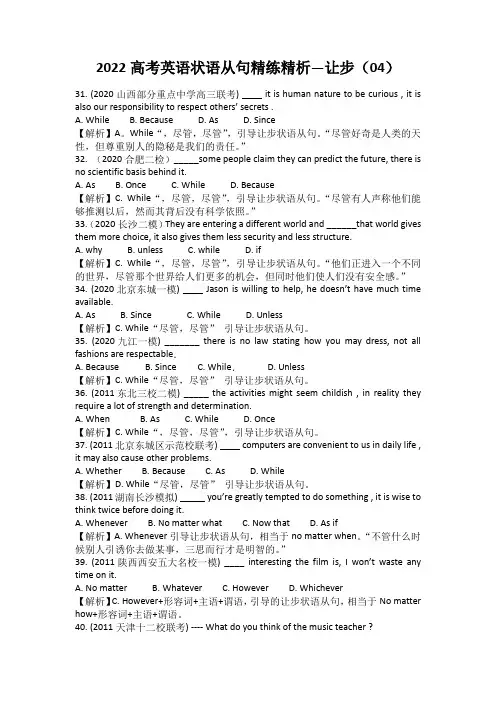
2022高考英语状语从句精练精析—让步(04)31. (2020山西部分重点中学高三联考) ____ it is human nature to be curious , it is also our responsibility to respect others’ secrets .A. WhileB. Because D. As D. Since【解析】A。
While“,尽管,尽管”,引导让步状语从句。
“尽管好奇是人类的天性,但尊重别人的隐秘是我们的责任。
”32. (2020合肥二检)_____some people claim they can predict the future, there is no scientific basis behind it.A. AsB. OnceC. WhileD. Because【解析】C. While“,尽管,尽管”,引导让步状语从句。
“尽管有人声称他们能够推测以后,然而其背后没有科学依照。
”33.(2020长沙二模)They are entering a different world and ______that world gives them more choice, it also gives them less security and less structure.A. whyB. unlessC. whileD. if【解析】C. While“,尽管,尽管”,引导让步状语从句。
“他们正进入一个不同的世界,尽管那个世界给人们更多的机会,但同时他们使人们没有安全感。
”34. (2020北京东城一模) ____ Jason is willing to help, he doesn’t have much time available.A. AsB. SinceC. WhileD. Unless【解析】C. While“尽管,尽管”引导让步状语从句。
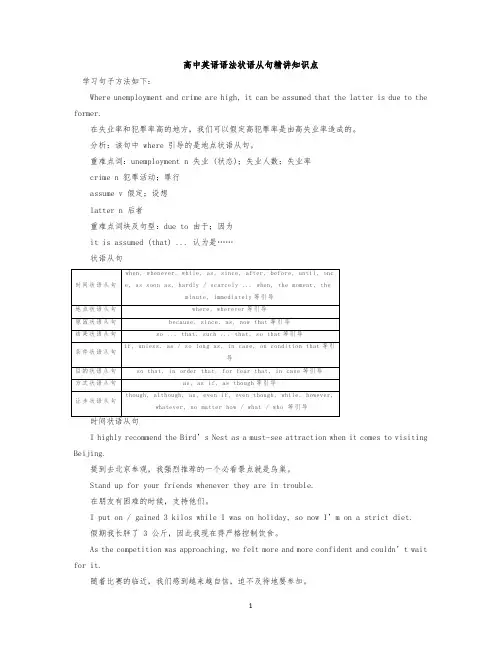
高中英语语法状语从句精讲知识点学习句子方法如下:Where unemployment and crime are high, it can be assumed that the latter is due to the former.在失业率和犯罪率高的地方,我们可以假定高犯罪率是由高失业率造成的。
分析:该句中 where 引导的是地点状语从句。
重难点词:unemployment n 失业 (状态);失业人数;失业率crime n 犯罪活动;罪行assume v 假定;设想latter n 后者重难点词块及句型:due to 由于;因为it is assumed (that) ... 认为是……状语从句I highly recommend the Bird’s Nest as a must-see attraction when it comes to visiting Beijing.提到去北京参观,我强烈推荐的一个必看景点就是鸟巢。
Stand up for your friends whenever they are in trouble.在朋友有困难的时候,支持他们。
I put on / gained 3 kilos while I was on holiday, so now I’m on a strict diet.假期我长胖了 3 公斤,因此我现在得严格控制饮食。
As the competition was approaching, we felt more and more confident and couldn’t wait for it.随着比赛的临近,我们感到越来越自信,迫不及待地要参加。
Many young people enjoy changing their phones for the latest ones once they are on sale.新手机一上市,许多年轻人就喜欢把自己的手机换成最新款的。

2.(2024课标卷)34. You have to move out of the way the truck cannot get past you.A. soB. orC. andD. but【答案】B【解析】考查并列连词。
上下文存在着逻辑上的条件关系,所以用“or”意为“否则的话”。
句意:你得挪一挪位置,否则卡车过不去。
4.(2024北京卷)21.—Look at those clouds!—Don’t worry. ______ it rains, we’ll still have a great time.A. Even ifB. As thoughC. In caseD. If only【答案】A【解析】考查状语从句。
even if 即便,as though好像,in case 以防,if only要是…...多好啊。
句意:—看看那些云!—不用担忧。
即使下雨,我们也会玩得很快乐的。
5.(2024天津卷)14.Everything was placed exactly ___________he wanted it for the graduation ceremony.A. whileB. whenC. whereD. though【答案】C【解析】考查状语从句。
地点状语从句。
句意:毕业典礼所须要的东西都被放在了他想放的地方了。
7.(2024上海卷)40.The map is one of the best tools a man has _ _ he goes to a new place.A. wheneverB. whateverC. whereverD. however【答案】A【解析】考查状语从句。
从句中有“地点a new place”作宾语,故解除BC选项。
很明显本句是时间状语从句。
句意:一个人无论什么时候到了一个新地方,地图就是他运用的最好的工具之一。
8.(2024重庆卷) 30.—Coach, can I continue with the training?—Sorry, you can’t ______you haven’t recovered from the knee injury.A. untilB. beforeC. asD. unless【答案】C【解析】考查状语从句。
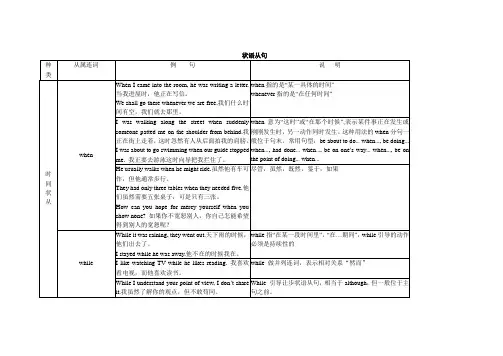
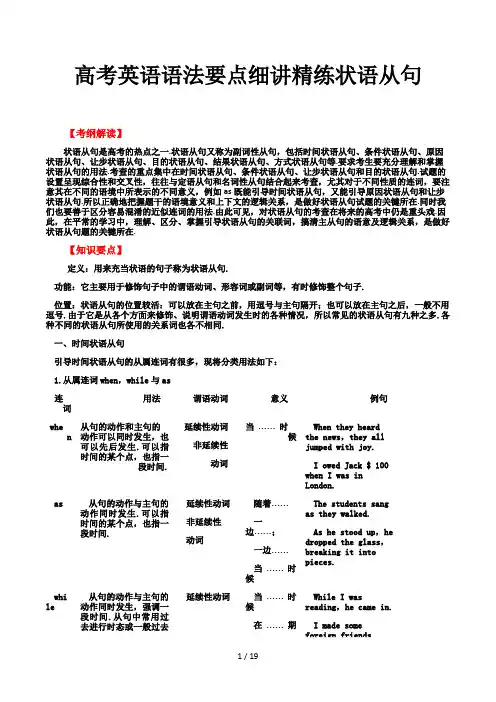
高考英语语法要点细讲精练状语从句【考纲解读】状语从句是高考的热点之一.状语从句又称为副词性从句,包括时间状语从句、条件状语从句、原因状语从句、让步状语从句、目的状语从句、结果状语从句、方式状语从句等.要求考生要充分理解和掌握状语从句的用法.考查的重点集中在时间状语从句、条件状语从句、让步状语从句和目的状语从句.试题的设置呈现综合性和交叉性,往往与定语从句和名词性从句结合起来考查,尤其对于不同性质的连词,要注意其在不同的语境中所表示的不同意义,例如as既能引导时间状语从句,又能引导原因状语从句和让步状语从句.所以正确地把握题干的语境意义和上下文的逻辑关系,是做好状语从句试题的关键所在.同时我们也要善于区分容易混淆的近似连词的用法.由此可见,对状语从句的考查在将来的高考中仍是重头戏.因此,在平常的学习中,理解、区分、掌握引导状语从句的关联词,搞清主从句的语意及逻辑关系,是做好状语从句题的关键所在.【知识要点】定义:用来充当状语的句子称为状语从句.功能:它主要用于修饰句子中的谓语动词、形容词或副词等,有时修饰整个句子.位置:状语从句的位置较活:可以放在主句之前,用逗号与主句隔开;也可以放在主句之后,一般不用逗号.由于它是从各个方面来修饰、说明谓语动词发生时的各种情况,所以常见的状语从句有九种之多.各种不同的状语从句所使用的关系词也各不相同.一、时间状语从句引导时间状语从句的从属连词有很多,现将分类用法如下:1.从属连词when,while与as连词用法谓语动词意义例句when 从句的动作和主句的动作可以同时发生,也可以先后发生.可以指时间的某个点,也指一段时间.延续性动词非延续性动词当……时候When they heardthe news,they alljumped with joy.I owed Jack $ 100when I was inLondon.as 从句的动作与主句的动作同时发生.可以指时间的某个点,也指一段时间. 延续性动词非延续性动词随着……一边……;一边……当……时候The students sangas they walked.As he stood up,hedropped the glass,breaking it intopieces.whi le从句的动作与主句的动作同时发生,强调一段时间.从句中常用过去进行时态或一般过去延续性动词当……时候在……期While I wasreading,he came in.I made someforeign friends时态. 间while I was inLondon.注: 1)when还可作并列连词,其意义为“那时,这时”,相当于and at this/that time.常用于以下句式:sb.was doing sth.when...某人正在干某事就在这时……sb.was about to/ going to do sth.when...某人正打算干某事就在这时……sb.body has just done somesth.when...某人刚干了某事就在这时……2)when还表示原因“既然”.如:It was foolish of you to take a taxi when you could easily walk here in five minutes.既然你可以步行五分钟就能到这儿,坐出租车来真是愚蠢.3)while作为并列连词,意为“而,却”,表示对比.He likes pop music,while I am fond of folk music.他喜欢流行音乐,而我却喜欢民间音乐.4)如果主句表示的是短暂动作,而从句用延续性动词的进行时态表示在一段时间内正在进行的动作时,when,while与as可互换使用.如:When/While/As I was walking down the street,I came across an old friend of mine.我在街道上走的时候,见到了我的一个老朋友.2.从属连词:as soon as,immediately,directly,the moment,the minute,nosooner...than...,hardly/scarcely... when...,once这些从属连词引导的从句都表示从句的动作一发生,主句的动作随即就发生,意为“一……就……”.从句中用一般时态代替将来时态.如:Once you remember it,you’ll never forget it.一旦你记住它,就永远不会忘记.The moment I heard the voice,.我一听到声音,就知道是父亲来了.No sooner had we arrived at the station than the train left.我们一到达车站,车就开了.注:no sooner...than...; hardly/scarcely...when...这一结构的时态搭配:no sooner与hardly/scarcely引导的主句谓语动词应用过去完成时,而than与when的从句中谓语应用一般过去时.此外,当把no sooner和hardly/scarcely提到句首时,应用倒装语序.我一到家,天就开始下雨了.I had hardly got home when it began to rain.→Hardly had I got home when it began to rain.3.till,until (not...until/till...直到……才)连词用法动词意义例句till/unt主语和从句都主句的动词一直到……为I’ll stay hereil 用肯定式为连续性动词止till/until therain stops.not...ti ll/until主句用否定形式,从句用肯定形式主句的动词为非连续性动词直到……才He didn’t gohome till/untilhe finished hishomework.注:1) till不可以置于句首,而until可以置于句首.如:Until you told me I had no idea of it.直到你告诉我,我对此事才有所了解.2)如果将“not until...”结构放在句首,那么主句要写成倒装句.如:Not until we pointed out their fault to them did they realize it.直到我们向他们指出了他们的错误,他们才意识到.4.every time,each time,next time等名词短语用来引导时间状语从句,表示“每当……,每次……,下次……”.如:Every/Each time I was in trouble,.每次我遇到麻烦,他总会来帮我.e,do remember to bring your son here.下次你来的时候,一定要记得把你儿子带来.5.从属连词:before(在……之前),after(在……之后),since(自从……以来).如:Please remember to turn off all the lights before you leave the classroom.离开教室前,请记得把所有的灯都关上.注:1)上述三个连词,既是从属连词,也是介词.2)若表达“还未……就……”“不到……就……”“……才……”“趁……,还没来得及”时,需用连词before.如:We had sailed four days and four nights before we saw land.我们航行了四天四夜才看到陆地.We hadn’t run a mile before he felt tired.我们跑了还不到一英里他就累了.Please write it down before you forget it.趁你现在没忘把它记下来.二、地点状语从句1.常用的引导词有where(在……地方),wherever(无论在什么地方)等.指具体地点时,从句可用于主句之前或之后,表示抽象条件时,从句须放在主句之前.如:The university graduates are determined to go wherever they are needed most.那些大学毕业生们决心去最需要他们的地方.They are planting trees where there is plenty of water and sunlight.他们在阳光雨水充分的地方植树.Where there is a will,there is a way.有志者事竟成.2.注意区分where引导的定语从句与状语从句.你最好在有问题的地方作个标记.You’d better make a mark where you have any questions.(状语从句)You’d better make a mark at the place where you have any questions.(定语从句)三、条件状语从句1.常用的引导词有if(如果,假如),unless(除非,要不……就不),as long as(只要),so long as(只要),provided (that)(只要),suppose/supposing(假设),on condition (that)(如果)等.如:.除非我能提前完成那个项目,否则我最近不会来看你了.We can surely attain our goal as long as we are united as one.只要我们团结一致,我们肯定能实现我们的目标.What shall we do if we can not get the necessary data?如果我们弄不到必要的数据,我们怎么办?They promised to let us have a meeting in their office on condition(that)we could keepit clean.如果我们能保持清洁,他们答应让我们在他们的办公室里开会.2.要点提示:1)在表示条件的状语从句中,既可以用直陈语气作“真实条件句”,也可以用虚拟语气作“非真实条件句”.至于把句子作成哪一种条件句,要依照“有关语法规则”和“表达意思的需要”而定. 2)用unless引导条件状语从句时,要注意这个连词自身在意义上是否定的:unless=if...not....因此,我们在逻辑上要注意:英文句子的用法和中文句子的译文.特别是当主句是否定句时,逻辑上的意思就成了“否定之否定而表示肯定”的情况了.如:I will not go to their party unless I am invited.这个句子的实际意义等于:I will not go to their party if I am not invited.这就是说,“我不去参加聚会”的条件是“我没有受到邀请”.“不去”与“没有受到邀请”就构成了“否定之否定而表示肯定”的情况了.)假如他们不邀请我,我不会去参加他们的聚会.He will finish the work in time unless something unexpected happens.这个句子的实际意义等于:He will finish the work in time if something unexpected does not happen.假如没有什么意外的事情发生,他会按时完成他的工作的.3)suppose/supposing这两个词所表达的意义和句法功能是一样的.它们与其他的引导状语从句的从属连词一样,引导一个含状语从句的主从复合句.而它们的特别之处在于:有时由它们所引出的条件状语从句常与主句分开而独立成句,但其意义和作用还是条件状语从句.这种情况多数出现在科技文章及某些论文里.如:Suppose no more rain fell into the Atlantic Ocean and no more water was brought to it byrivers.It would take the ocean about 4000 years to dry up.假如不再有雨水注入大西洋,不再有河水流入大西洋的话;大约需要四千年的时间大西洋才会枯竭. Suppose your statement is right.How are you going to prove it?假定为你的观点是正确的,你打算如何证明这一点呢?Suppose this poor girl is yours.We’d like to know how much you know about her.假设这个可怜的女孩就是你的;我们想了解你知道多少关于她的情况.四、原因状语从句1.常用的引导词有because因为,as由于,since既然,由于,now that既然,由于,not that...but that不是因为……而是因为……,seeing that,considering that等.如:He can’t deliver his lectures today because he has got a bad cold.他今天不能去讲课了,因为他患了重感冒.I may not be able to attend your wedding party not because I’m not willing to butbecause I’ve been caught by something recently.我或许无法参加你的婚礼了,不是我不想去而是近来有些事情缠着我无法脱身.2.要点提示:1) 从属连词用法区别区别项目位置内涵语气能否回答why能否被强调because因为主句前或后直接因果关系强能能as由于主句前或后since/now that既然主句前双方都知道的原因弱不能不能主句前if/when 主句前或后2)关于since和now that这两个词在表示原因的时候是近义词,都表示“既然”.但其不同之处在于:now that只能以“新发生的情况”作为某事发生的原因;而since在表示“既然”时,就没有这种限制.如:Now that the rain is going to stop,we’d better get ready for the afternoon’s match. 既然雨要停了,我们最好为下午的比赛作好准备.(此句中,now that引出的从句显然是表示“新出现的情况”,在句子中作“主句动作发生的原因”.也就是说,只有在这种情况下才可以用now that引导从句,表示“既然”.)Since you’re so interested in English,why not have a try in the English SpeechContest?既然你对英语这么有兴趣,为什么不试一试参加英语演讲比赛?3)其他表示原因的方式除了状语从句外,一些介词短语同样可以表示原因,这样的短语有because of; thanks to; due to; owing to等.五、让步状语从句引导让步状语从句的从属连词有though(虽然),although(虽然),even if(即使),even though(即使),as(尽管),while(虽然),whether...or...(无论……还是……),no matter+疑问词(无论).1.though或although引导让状语从句.although与though两者意思相同,一般可互换,都可以与yet,still或nevertheless连用,但不能和but连用.如:He is unhappy though/although he has a lot of money.虽然他有许多钱,但他并不幸福.Although/Though it was raining hard,yet they went on playing football.尽管雨下的很大,但他们仍在继续踢足球.注:though还可用作副词,意为“可是,然而”,置于句末.如:e;he didn’t though.他说他会来,可是他没有来.2.当as作“尽管,虽然”的意思讲引导让步状语从句时,从句往往放在主句的前面,而且用作让步的部分(表语、状语或动词原形)总是提前到句首.若表语是名词,前置时要省略冠词.如:Child as he is,he knows a lot.尽管他是孩子,他却懂得很多.Old as he is,he is still energetic.尽管他老了,却依然精力充沛.(表语作为让步的内容,因此提前了.)Try as he might,he couldn’t solve the problem.尽管他很努力了,但还是无法解决这个问题.(谓语提前了)Much as you suspected him,you couldn’t provide powerful evidence.虽然你非常怀疑他,但是你却无法提供有力的证据.(状语作为让步的内容,因此提前了.)3.whether...or(不管……)疑问词+ ever与no matter+疑问词(不管……,无论……).however(不管怎样),whatever(无论什么),whoever(无论谁).no matter when(how,what,who,where,which)无论何时(怎样,什么,谁,何地,哪个)等.如:Air exists everywhere although we can’t see it.尽管我们看不见空气,但它却无处不存在.No matter where you go on the earth,you will feel the gravity.无论你走到地球的什么地方,你都会感觉到地引力.We’.无论他来不来,我们将准时开会.Even if we are approaching the end of the experiment,we still have no time to lose.即使我们即将完成试验,我们依然要分秒必争.注:whoever,whatever,whomever,whichever还可以引导名词性从句.如:You can take whatever you like.你可以拿任何你所喜欢的东西.六、方式状语从句常用的引导词有as(如同,按照),as if(似乎,仿佛),as though(似乎,仿佛)等.如:He speaks English almost as a native speaker does.他的英文几乎说得如讲英语母语的人一样.He speaks English as if he were a native speaker.他讲英文的样子似乎像说英语母语的人.She looked unwell as though she got a bad cold.她看上去身体不适好像患有重感冒.In this reading room you can read anything as everyone does here.在这间阅览室里,你可以像这儿的每个人一样想看什么就看什么.要点提示:as if或as though引导的方式状语从句中,如果表示真实情况应该用直陈语气;如果表示非真实情况则应该用虚拟语气.关于这一点也取决于说话人的态度、看法.如:It gets darker and darker in the sky as if it’s going to rain.天越来越暗了似乎要下雨了.(表示真实情况,是直陈语气)She speaks as if she knew everything in the world.她说话的样子仿佛似她懂得天下事.(表示非真实情况,是虚拟语气)七、目的状语从句常用的引导词有so that(以便,为了),in order that(为了),lest(以免,以防),in case(以免,以防),for fear(以免,以防)等.如:We should do our utmost in order that we may be able to over fulfill the task.为了超额完成任务,我们应该全力以赴.You’.你最好将电话号码留给我,以便我下次来之前可以先给你打个电话.Batteries must be kept in dry places for fear that electricity leaks away.电池应该放在干燥的地方,以免漏电.要点提示:在目的状语从句中,我们可以将这些引导目的状语从句的连词so that,in order that,lest,in case,for fear分作为两大部分:表示肯定——so that,in order that是“为了使……发生(目的是……,为的是……)”.表示否定——lest,in case,for fear 是“为了使……不发生(以免,以防)”.另外,在表示否定的目的状语从句中,谓语动词往往用“should+动词原形”或“动词原形”两种虚拟句式.如:He took his umbrella with him lest it should rain.他带了雨伞,以防下雨. I ’ll keep a seat for you in case you should change your mind.我给你留个座,没准你会改变主意. 八、结果状语从句1.常用的引导词有that (结果,以至),so that (结果,以至),so...that (如此……以至),such...that (如此……以至)等.如: .温度升高了气体的体积就增大了.The mountain is so high that she can ’t climb it up to the top. 那座山太高了,她无法登上山顶.It is such a lovely day that everybody feels happy and gay. 天气这么好,人人都感到高兴、快乐.注:1)so...that 和such...that 都是引导结果状语从句的从属连词,它们都表示“如此……以至”,但其要求的句型结构不一样. ⎪⎩⎪⎨⎧从句 +名词++从句+可数名词单数形式++形容词+从句副词++形容词that few/little many/much/so that a/an so that/so ⎪⎩⎨⎧从句+名词++从句不可数名词+式+形容词+复数名词形从句数形式++形容词+可数名词单+that of of/lots lot a such that /such that a/an such如:He ran so fast that his brother couldn ’t catch up with him. 他跑得太快了,他弟弟赶不上他. .他是那么个调皮的孩子,以至在邻里中不受欢迎.She looks so lovely that everybody can ’t help taking a look at her when passing her by.她生得太可爱了,从她身边经过的人都忍不住要看她一眼. 2)当so 或such 置于句首时,主句要用倒装语序.如:So clever was he that he was able to work out all the difficult problems.他是如此聪明以至于他能解出所有的难题.2.除结果状语从句外,too...to...(太……而不能……),enough to...(能够……),so...asto...(那么……以至于……)等不定式结构同样可以表示结果.如: 他起床晚了,结果误了车.He didn ’t get up early enough to catch the bus.=He got up too late to catch the bus.=He got up so late as to miss the bus.九、比较状语从句常用的引导词有than(比……),as...as(如……一样……),“the +比较级...,the+比较级...”(越……越……)等.如:He is taller than his brother.他比他弟弟个高一些.The more they discover about the brain,the more questions they can’t answer in that area.他们越多地发现有关人脑的情况,他们就有越多的问题无法回答.要点提示:有关比较状语的问题请看前面“形容词与副词的比较级和最高级”一章.这里只提醒一个关于比较状语从句的问题.那就是:than和as...as中的第二个as都是连词,后面若是人称代词,常用主格形式.如:Her mother is not as tall as she(is).她妈妈没有她个高.I don’t think that he is taller than I.我并不认为他比我个高.十、状语从句中的省略1.若从句中的主语与主句的主语一致,同时从句中又含有系动词be,则通常省去从句的主语和系动词be而保留其余部分.如:While (she was) very young,she began to study English.她很小的时候就开始学英语.2.若从句主语是it,动词是系动词be,则通常省去主语it及系动词be而保留其余部分.如:Everything went on better than (it had been) expected.一切进展得比预料的要好.3.若从句中部分内容与主句中的部分内容相同,可将从句中的此部分内容省略.如:She has no money.If (she has) any,she will give us.她没钱,如果有的话,她会给我们的.【考点诠释】考点1 状语从句的时态高考主要考查时间、条件、让步状语从句用一般现在时表将来及一般过去时代替过去将来时的用法.如:①He said he would go to Japan for holiday when he finished writing the book.他说他写完这本书后会去日本度假.②Even if it snows tomorrow,the performance won’t be called off.即使明天下雪,演出也不会取消.考点二状语从句的结构高考主要考查结构较为复杂、特殊的状语从句,如no matter+疑问词;whatever,however,as引导的让步状语从句;“the+比较级…,the+比较级”中的比较状语从句等.如:①The harder you work,the better your studies will be.你学习越努力,功课就越好.②No matter what serious difficulties he met with,m.不管碰到多么可怕的困难,他总能克服.考点3 状语从句的省略在时间、原因、条件、方式、让步等状语从句中,常常省略相同的主语或作主语的代词it以及be动词,保留现在分词、过去分词、介词短语、不定式等成分.如果从句中有“it is+形容词”,也可以省略it is.如:①Once printed,this dictionary will be very popular.一旦出版,这本词典会非常畅销.(once后省去了it is)②Do not leave the building until instructed to do SO.接到指示后才可离开这幢房子.(until后省去了you are)考点4 从属连词的选择和辨析高考重点考查引导状语从句的从属连词,如引导时间状语从句的immediately,the moment,every time,once;引导条件状语从句的as long as;引导原因状语从句的now that,since;引导让步状语从句的even if,even though;引导目的状语从句的in case,in order that等.如:①We hadn’t met for 20 years,but I recognized him the moment I saw him.我们已经有20年没见面了,可是我一见到他就认出他来了.(时间状语从句)②We should bring a knife in case that there ale any dangerous animals there.我们应当带把刀,以防那儿有什么危险动物.(目的状语从句)考点5 where引导地点状语从句要注意where引导的地点状语从句和where引导的定语从句、表语从句以及宾语从句的区别.如:①The flower grows best where it often rains.这种花在经常下雨的地方长得最好.(地点状语从句)②The flower grows best in the place where it often rains.这种花在经常下雨的地方长得最好.(定语从句)典题链接【示例1】It is almost five years ______ we saw each other last time.A.beforeB.sinceC.afterD.when解析:此题考查时间状语从句的用法.这是一个典型的句型结构:It is/has been+段时间+since+句子(一般过去时).句子意思是:自从我们上次见面几乎有五年了.答案:B【示例2】There were dirty marks on her trousers ______ she had wiped her hands.A.whereB.whichC.whenD.that解析:根据句子结构,由于从句结构完整,可排除B、D两项;前面的先行词是on her trousers表地点,where在此引导状语从句,where相当于in the places where,本句意思是:在她裤子上擦手的地方有脏迹.答案:A特别提示:学会将where引导的状语从句转换成介词短语(地点)+where引导的定语从句是逐步掌握这种用法的好办法.【示例3】We were told we should follow the main road _____ we reached the central railway station.A.wheneverB.untilC.whileD.wherever解析:根据两句子的关系——不存在让步,从而可排除选项A、D;再根据句意,表示until前面的动作或者状态一直持续到until后面的地点或时间.答案选B.本句意为:有人告诉我们应沿大路走,一直走到中心车站.答案:B【示例4】You can eat food free in my restaurant _____ you like.A.wheneverB.whereverC.whateverD.however解析:主句部分不缺主、宾、宾补成分,也有具体的地点状语,应选A.本句意为:无论任何时候你都能在我饭店里免费吃饭.答案:A【示例5】We were swimming in the lake _____ suddenly the storm started.A.whenB.whileC.untilD.before解析:when表示这时突然,相当于suddenly.其常用结构有were/was doing...when...;were/was about to do...when...;had/had not done...when....答案:A【示例6】You should try to get a good night’s sleep _____ much work you have to do.A.howeverB.no matterC.althoughD.whatever解析:根据句子结构,排除选项B、C,因B项后面需连接副词when,how,where或连接代词who,what,而C项后面的句子不能倒装;当名词前有much,many,little,few等修饰时,前面不能用whatever,应选A.【示例7】I’d like to arrive 20 minutes early _____ I can have time for a cup of tea.A.as soon asB.as a resultC.in caseD.so that解析:此题考查目的状语从句的用法.as soon as“一……就”, as a result “结果是”,in case“万一”,so that“以便于”.答案:D【示例8】Scientists say it may be five or six years _____ it is possible to test this medicine on human patients.A.sinceB.afterC.beforeD.when解析:根据句子的意思,科学家对药品先要进行反复试验后才能用于病人身上,因此答案选C.此题考查了before的固定句型,即It was/will be+时间段+before+主+谓(did/do).答案:C特别提示:要选对连词,一定要清楚主从句之间的语意和逻辑关系.思维升级怎样做好状语从句试题呢?首先我们应该系统地掌握状语从句的基本知识,把握每个连词的具体用法;其次我们要正确区分容易混淆的连词,像as,when,while,since,even if,as if等;再者,要善于理清句子的逻辑关系,要具备分析长难句的能力.要特别注意as引导让步状语从句、时间状语从句、方式状语从句和原因状语从句的不同用法.例如:As time went on,Einstein’s theory proved to be correct.(时间)As(=Since) the weather is fine,let’s go.(原因)Do as you like.(方式)Child as/though he is,he knows a lot.(让步)思维链接【示例11】_____ I explained on the phone, your request will be considered at the next meeting.A.WhenB.AfterC.As解析:此题考查as引导定语从句和状语从句的区别.此题中as引导的是非限制性定语从句,as指代后面整句话的内容,意为“正如……”.句子意思是:正如我在电话里所解释的,你的要求会在下次会议上考虑.A和B两项都指时间,D项表示“既然”,指原因,都引导状语从句.答案:C特别提示:since既可以引导时间状语从句,表示“自从……开始”,也可以引导原因状语从句,表示“因为、既然”.It’s/It has been 10 years since he enjoyed a good dinner.Since you have finished your work,you are free to do what you like.【试题放送】【2018江苏卷】30. ____ One's life has value one brings value to the life of others.A. so thatB. no matter howC. as long asD. except that【考点】连词【答案】C【解析】as long as意为“只要”;so that意为“以便;因此”;no matter how意为“不管怎样”;except that意为“除了”.句意为:只要一个人给别人的生活带来价值,那么他的生命就有价值.,根据题意,应选C项. 【难度】一般【2018湖南】32. ____ hard you try, it is difficult to lose weight without cutting down the amount you eat.A. HoweverB. WhateverC. WhicheverD. Whenever【答案】A【考点】此题考查状语从句引导的用法.【解析】句意为:不管你如何(however)努力,如果你不减少食量是很难减肥的.复合句让步状语从句引导词however【2018湖南】28. ____ I always felt I would pass the exam, I never thought I would get an A.A. WhileB. OnceC. IfD. Until【答案】A【考点】此题考查状语从句引导词用法.【解析】句意为:虽然我总觉得我考试能过关,但我从没想过我能得优.While常见含义有“虽然;然而,而;在……期间,当……时;趁着”等,此处为“虽然”之意.复合句让步状语从句引导词while【2018重庆卷】30.—Coach, can I continue with the training?—Sorry, you can’t ______you haven’t recovered from the knee injury.A. untilB. beforeC. to considerD. unless【考点】状语从句【答案】 C。
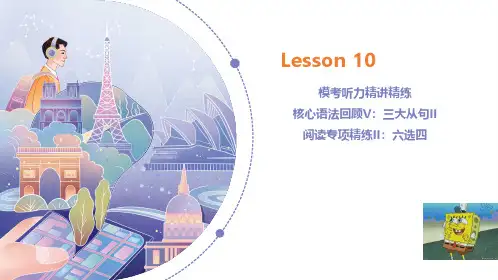
模考听力精讲精练核心语法回顾V :三大从句II阅读专项精练II :六选Lesson 10 四本讲目录模考听力精讲精练模考听力短对话讲解模考听力长对话训练核心语法回顾V:三大从句II最难的状从来了你怕吗?阅读专项精练II:六选四(A) What Is Nonverbal Communication?(B) Motivating Employees under Unfavorable ConditionsQuiz: Why you should not worry about procrastination听力能力提升听力只能练!练!练!解题指导☞听力短对话作答听力短对话时,常见问题如下:,仔细辨别题目中可能存在的②需在加以克服。
③缺乏综合策略:考生纠结于部分无法确定答案的题目,影响后续题目的正常作答。
由于短对话文本与问题只播放一遍,即使某一题无法明确答案,仍需紧跟听力内容保持作答节奏6. A. Get a new bus schedule. B. Read the notice on the window.C. Go and ask the ticket seller.D. Board the bus to Cleveland.Annie提示:Short ConversationsW: Oh, that wasn’t me. That was my sister Jane. She’s in your class.Q: What does the woman mean?Annie再次提示:Short Conversations的选项中如出现第三位人物(the man/the woman之外), 务必理清人物关系与评价。
8.took overB. He is making plans to expand his operation.M: Fifteen years if you can believe that. I bought it from a small operation to what it is today.Q: What do we learn about the man?PHRASAL VERB If you take over a company, you getcontrol of it, for example, by buying its shares. 接管(公司)9. A. The man and the woman are working on a joint project.B. The woman is going to make her topic more focused.C. It took a lot of time to get the man on the right track.D. One should choose a broad topic for a research paper.M: You are on the right track. I just think you need to narrow the topic down.W: Yeah, you’re right. I always start by choosing too broad a topic when I’m doing a research paper.Q: What do we learn from the conversation?图片来自网络,侵权请联系删除10.B. The woman’s kids can play football with his son.C. Many children feel bored when left alone.look forward to it all week.Q: What does the man mean?Annie再次提示:Short Conversations那么,这套听力短对话带给我们什么了呢?Annie提示1:任何题型中的but/yet/however后往往为重点所在,听力短对话尤其如此。
2024年高中英语语法学习之状语从句精讲英语状语从句是英语学习中的一个重要考点,下面将针对英语状语从句进行考点归纳。
一、时间状语从句时间状语从句是语法中的一个重要考点,下面是一些常见的时间状语从句: when:表示某个时间点或时间段,如“I will arrive at the airport when the plane takes off.”before:表示某个时间点或时间段之前,如“I will eat breakfast before I go to work.”after:表示某个时间点或时间段之后,如“I will finish my homework after I have dinner.”while:表示某个时间点或时间段持续,如“I was studying while she was sleeping.”as soon as:表示某个时间点或时间段一过去就发生,如“I will call you as soon as I get home.”until:表示某个时间点或时间段一直持续,如“I won't leave until I have finished my work.”since:表示某个时间点或时间段以来,如“I have been living in this city since I moved here last year.”when/while/as:这些词都可以引导时间状语从句,但它们的使用略有不同,需要根据具体语境选择使用哪个。
需要注意的是,如果主句是一般将来时,从句只能用一般现在时,如“I will go to the store tomorrow”中的“tomorrow”就是时间状语从句。
二、地点状语从句地点状语从句是语法中的一个重要考点,下面是一些常见的地点状语从句: where:表示某个地点,如“I will go to the store where I bought the groceries.”that:表示某个地点或位置,如“I saw a beautiful sunset over that mountain.”which:表示某个地点或位置,如“The building which is on fire needs to be evacuated immediately.”where/that/which:这些词都可以引导地点状语从句,但它们的使用略有不同,需要根据具体语境选择使用哪个。
考点07 状语从句(核心考点精讲精练)近3年真题考点分布【思维导图】【知识梳理】★九种状语从句梳理(时间、条件、原因、地点、目的、结果、方式、让步、比较)➢考点一、时间状语从句1.when,while和as引导的时间状语从句While some people are motivated by a need for success,others are motivated by a fear of failure.尽管有些人被成功的渴望所激励,但也有一些人却被失败的恐惧所激发。
As the average age of the population increases,there are more and more old people to care for.随着人口平均年龄的增长,有越来越多的老年人需要照顾。
2.表示“一……就……”的连词引导的时间状语从句(1)as soon as,the moment,the minute,the instant,immediately,directlyThe moment my aunt gained her diploma after four years of hard work,she was filled with joy.我阿姨苦读四年之后获得了文凭,那一刻她欣喜万分。
(2)在hardly...when...,no sooner...than...结构中,主句用过去完成时,than或when所在的从句用一般过去时。
I had hardly got to the office,when my wife phoned me to go back home at once.我刚到办公室,妻子就打电话让我回家。
3.before,since引导的时间状语从句(1) before表示“在……之前;还未……就……;还没有来得及……就……”。
常用句式:It will be/was+一段时间+before...过了……时间才……;It won't be/wasn't+一段时间+before...没过多久就……。
高考英语状语从句语法知识点梳理(名师总结基础语法知识点,值得下载)在复合句中修饰主句或主句中的某一成分的从句叫状语从句。
状语从句通常由从属连词或起连词作用的词组引导,有时甚至不需要连词直接和主句连接起来。
状语从句根据它表达的意思不同,可分为时间、地点、原因、目的、结果、条件、方式、比较、让步等九类。
一、时间状语从句时间状语从句是表示时间关系的从句。
可以引导时间状语从句的连词很多,根据意义和主从句之间的时间关系,通常可分为以下几种情况:A.when, while, as, wheneverwhen, while, as表示主句谓语作和从句的谓语动作同时发生或几乎同时发生。
1.when①when表示点时间时,从句中用短暂性动词;表示段时间时,用持续性动词。
When I got home, my family were already having dinner.我到家的时候,全家已在吃晚饭。
(when表示点时间)When they were still talking and laughing, the teacher came in.当他们还在说笑的时候,老师进来了。
(when表示段时间)He waved a hello when he saw her.当他看见她的时候,就挥手打了个招呼。
(when表示点时间)When you think you know nothing, you begin to know something.当你认为自己一无所知的时候,就开始知道一些事情了。
(when表示段时间)注意:当when意思是正当……时候(and at that moment)时,when只能跟在前一分句之后。
He was about to go to bed when the doorbel rang.他正要上床,忽然门铃响了。
They were watching the World Cup when suddenly the lights went out.他们正看着世界杯比赛,突然灯灭了。
专题九状语从句一、地点状语从句地点状语从句通常由where, wherever 引导。
Where there is a will, there is a way.Wherever you go,I'm right here waiting for you.二、方式状语从句方式状语从句通常由as, (just)as...so..., as if, as though引导。
1.as,(just)as...so...引导的方式状语从句通常位于主句后,但当(just)as...so...结构位于句首时,as从句带有比喻的含义,意思是“正如;就像”,多用于正式文体。
Always do to the others as you would be done by.As water is to fish, so air is to man.Just as we sweep our rooms, so we should sweep backward ideas from our minds.2.as if, as though两者的意义和用法相同,引出的状语从句谓语多用虚拟语气,表示与事实相反;有时也用陈述语气,表示所说情况是事实或实现的可能性较大。
译作“仿佛……似的;好像……似的”。
They completely ignore these facts as if (as though)they never existed.He looks as if ( as though)he had been hit by lighting.It looks as if the weather may pick up very soon.三、原因状语从句比较because, since, as和for的用法:1.because语势最强,用来说明人所不知的原因,回答why提出的问题。
当原因是显而易见的或已为人们所知的,就用as或since。
I didn't go, because I was afraid.Since / As the weather is so bad, we have to delay our journey.2.由because引导的从句如果放在句末,且前面有逗号,则可以用for来代替。
如果不是说明直接原因,而是多种情况加以推断,就只能用for。
He is absent today, because / for he is ill.He must be ill, for he is absent today.四、目的状语从句表示目的状语的从句可以由so that, in order that, lest, for fear that, in case等词引导。
You must speak louder so that / in order that you can be heard by all.He wrote the name down for fear that(lest)he should forget it.Better take more clothes in case the weather is cold.五、结果状语从句结果状语从句常由so...that 或such...that引导。
so...that与such...that之间可以转换。
The boy is so young that he can't go to school.He is such a young boy that he can't go to school.六、条件状语从句连接词主要有if, unless, as / so long as, on condition that等。
Let's go out for a walk unless you are too tired.If you are not too tired, let's go out for a walk.七、让步状语从句1.though, although引导的让步状语从句,后面的从句不能有but,但是though 和yet可连用。
Although it's raining, they are still working in the field.He is very old, but he still works very hard.Though the sore is healed, yet a scar may remain.2.as, though 引导的让步从句必须将表语或状语提前(形容词、副词、分词、实义动词原形提前)。
Child as / though he was, he knew what was the right thing to do.3.ever if, even though“即使”。
We'll make a trip even though the weather is bad.4.whether...or...“不管……都”。
Whether you believe it or not, it is true.5.“no matter +疑问词”或“疑问词+-ever”。
No matter what happened, he would not mind. =Whatever happened, he would not mind.高考对状语从句的考查主要体现在省略,时态的替代,语序的倒装以及连词的辨析四个方面。
1.成分的省略(1)在时间、地点、条件、让步、方式等状语从句中,如果主语是it或与主句的主语一致,且谓语动词含有be时,可把从句的主语和be一起省略。
Don't speak until (you are) spoken to.Do come to see me whenever (it is) possible.(2)在比较状语从句中,可省略与主句相同的部分。
I know you more than he (knows you).Tom is two years older than Alice (is).(3)as (尽管)引导让步状语从句倒装时,表语提前,且其前的冠词要省略。
Hero as he is, he has shortcomings.2.时态的替代(1)在时间、条件和让步状语从句中须用一般现在时替代一般将来时,用一般过去时替代过去将来时。
If it rains tomorrow, we won't go fishing.Don't get off the bus until it has stopped.(2)The more...the more...句型中,前句起条件状语从句作用,故用现在时表将来。
The harder you work, the greater progress you'll make.(3)after, before, as soon as等连词本身就暗示了时间的先后,因此可用一般过去时代替过去完成时,而不会产生时间上的混乱。
I went to bed after I (had) finished my homework.The film star (had) left before the reporter arrived.He got down to work as soon as he (had) go to the factory.3.语序的倒装(1)no sooner...than..., hardly / scarcely / barely...when...句型中的主句常用过去完成时,从句常用一般过去时,且置于句首时主句要倒装。
No sooner had he got home than it began to rain.(2)so / such...that...,not until...置于句首时主句要倒装。
So angry did she feel that she couldn't speak.Not until he told me the truth did I realize what had happened.4.连词的辨析。
根据上下文的语意推断属于哪种状语从句,然后选择连词。
高考真题探究(2006—2011年)【2011全国卷II 19】It was a nice meal, _______a little expensive.A. thoughB. whetherC. asD. since【答案】A【考点】考查连词。
句意:那顿饭真美味,尽管有点贵。
Though”尽管”,引导让步状语从句,该句使用了省略形式,补全为“though it was a little expensive”注意as也可以表示“尽管”,但as作此意时必须使用倒装结构。
【解析】【2011北京卷29】__________ volleyball is her main focus, she’s also great at basketball.A. SinceB. OnceC. UnlessD. While【答案】D【考点】考查让步状语从句。
【解析】句意为:虽然排球是她的主要项目,但她还擅长篮球。
while“虽然,尽管”,引导让步状语从句。
Since“自从”once“一旦”unless“除非”均不合题意。
【2011上海卷36】If a lot of people say a f ilm is not good, I won’t bother to see it, or I’ll wait ____ it comes out on DVD.A. whetherB. afterC. thoughD. until【答案】D【考点】考查状语从句。
【解析】句意为:如果众人都说一部电影不好,我不会急着去看,或者会等到结果出来。
【2011上海卷37】The police officers in our city work hard _____ the rest of us can live a safe life.A. in caseB. as ifC. in order thatD. only if【答案】C【考点】考查状语从句。
【解析】句意为:为了让我们大家过上平安的日子,我市警察工作非常卖力。
【2011江西卷29】Please call my secretary to arrange a meeting this afternoon, or ______ it is convenient to you.A. wheneverB. howeverC. whicheverD. wherever【答案】A【考点】考察状语从句连接词【解析】whenever无论何时,however然而whichever任何一个wherever 无论哪里。